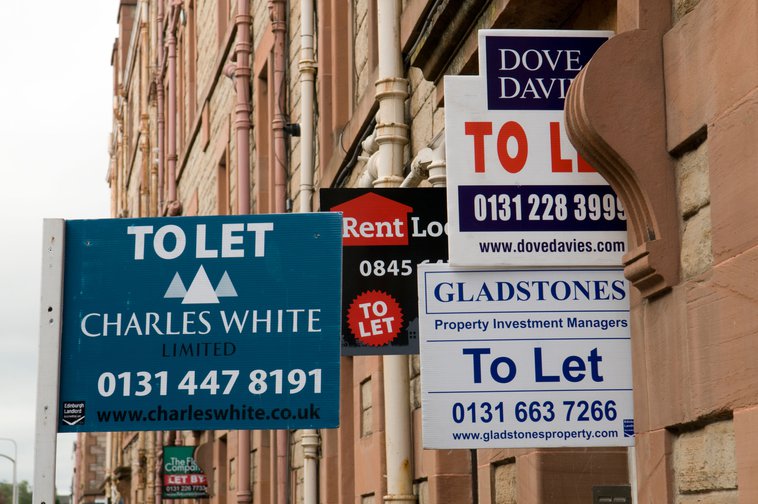Revealed: UK private tenants hit by record annual rent hikes
08-23-2022

Housing campaigners warn that renters could be pushed into poverty and homelessness without evictions freeze
Ruby Lott-Lavigna
Estate agents' signs in Edinburgh, Scotland | Iain Sharp / Alamy Stock Photo
UK private sector rents in the last year saw their highest jump since records began in 2016, according to new data.
Campaigners have renewed calls for a freeze on evictions, similar to that seen during the COVID pandemic, as the soaring cost of living leaves tenants facing impossible choices between food, heating and rent.
Figures from the Office for National Statistics (ONS) show landlords pocketed an average 3.2% more in the 12 months to July 2022. Real-terms wages fell by record amounts between April and June, it was revealed yesterday.
The rising costs – which are likely to be much higher for new tenancies – could push people into poverty or homelessness as the UK struggles with its worst cost of living crisis in decades, housing charities warned.
“There definitely is a risk of more people being made homeless,” Krishan Shah, an economist from the Resolution Foundation, told openDemocracy. “The issue is more people into poverty – relative poverty and in some cases into absolute poverty as well.”
Scotland saw the worst increase in rents at 3.7%, while England saw a 3.2% increase and Wales a 2.1% rise. Since January 2015, rental prices across the UK have risen overall by 14.3%.
The sharp rise in rents – which is expected to disproportionately affect people of colour, younger people and those from poorer backgrounds – is due, in part, to a reduction in housing stock caused by landlords leaving the rental market and selling their property, and competition for properties in areas where jobs are centralised.
Shah added: “You’ve got food inflation running at close to 10% and you’ve got energy bills set to increase further in October – this is just difficult for a lot of families,” said Shah. “They don’t really have the resilience in their budget to deal with other cost of living increases.”
The rental figures come as UK inflation hits 10.1% – its highest figure since 1982 – and energy bills threaten to top £4,266 a year.
“As rents continue to increase and wages stagnate, tenants are being put under increasing strain to keep paying their bills,” said Tilly Smith, Campaigns and Partnerships Officer for campaign group Generation Rent.
“Many are being forced to make the heartbreaking choice between putting food on the table and paying the rent. And those who cannot keep paying the rent will face eviction and homelessness.
“As the cost-of-living crisis worsens, more support needs to be given to renters now. The government must freeze rents and pause no fault evictions and evictions for rent arrears.”
Scottish Labour has called for an emergency rent freeze to protect vulnerable tenants.
Labour is expected to announce policies targeting the housing crisis in September to coincide with its party conference, following a call this week to freeze energy prices.
Imogen Hector, a private tenant in London, was forced out of her home after her landlord raised the rent by 9%.
“My ex-landlord wanted to extend my contract for only six months as she was selling the flat, as well as putting up the rent by £150 per month,” she said.
According to the Homelet Rental Index, which provides data on rent increases for new tenancies only, rents are increasing closer to a rate of 9.5%.
Private sector tenants have told openDemocracy of rent increases totalling hundreds of pounds, with landlords often using Section 21 (‘no fault’) eviction notices to force tenants to pay the increase or leave. In 2019, the Conservative government pledged to ban Section 21 (‘no fault’) evictions, a policy that is yet to materialise.

